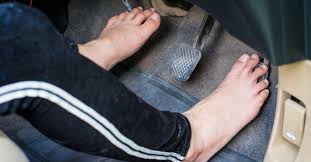Driving Barefoot in New Jersey: Is It Legal? This false belief has been around for a long time, often simply because people fear for their safety. Driving barefoot, however, is legal in New Jersey and most other states.
Why Do People Think It’s Illegal?
Perhaps the concern for safety is why, about this time, people ought to believe that it’s illegal to drive barefoot. Those who drive may think that not wearing shoes could cause crashes because bare feet may not grip the pedals as well, or it may cause injuries to the foot.
Others would believe that driving barefoot is against the law as others require driving with care and caution since there are certain rules for road safety. Even though these things are bad for safety, New Jersey does not forbade driving without wearing shoes.
Potential Safety Concerns
It is legal to drive barefoot, but it is not always the safest thing to do. Wet or sweaty feet tend to slide off the wheels
Without shoes, that gives your feet extra grip, you might lose control of your car quite easily- especially when stopping quickly or in an emergency.
Some drivers might find it awkward or uncomfortable to press the pedals without shoes on, which could make them respond more slowly.
However, some drivers think they can control the pedals better when they do not have big shoes on. This is especially true when they are wearing flats, high heels, or flip-flops that tend to slip or get caught under the pedals.
Driving in Certain Footwear Could Be Riskier
Even though it is legal to drive barefoot, wearing some kinds of shoes could be more dangerous. Shoes like flip-flops, high heels, and even shoes that are too loose can make it harder to use the pedals safely.
For instance, flip-flops are easy to lose or get caught under the brake or pedal, which can be very dangerous. On the other hand, wearing high heels can make it somewhat difficult to press the pedals in the proper position.
For this reason, safety advocates sometimes argue that driving barefoot is safer than driving in hazardous shoes. However, if you are likely to wear shoes, it is recommended to wear the safest and easiest types – sneakers or flat shoes.
What Do You Do If You Get Pulled Over?
If you are stopped in New Jersey going barefoot, the officer will not give you a ticket just because you didn’t wear any shoes. At least there is no law that says drivers have to wear shoes in the state.
The cop could give you a ticket, however, if they feel that driving barefoot did indeed make you more likely to be reckless or careless or if it made you break another law.
For instance, if you were driving barefoot and then lost control of your car because your foot slid off the gas button, then you could be charged with careless driving.
This is a more serious offense that can get you fines and points on your record. But the ticket would not just be for the fact that you were barefoot.
Other States’ Laws
NJ is not the only state that does not have a rule against driving barefoot. No U.S. state specifically forbids driving barefoot, and many other states have made it clear that it is allowed to do so.
In Alabama and some other states, motorcycle users are the only ones who have to wear shoes for safety reasons. In contrast, car drivers are not required to wear shoes.
Tips for Safe Driving
These safety tips are important to remember if you want to drive barefoot:
Make Sure Your Feet Are Dry: Wet or slippery feet can make it harder to grip the pedals, which increases the chance of slipping.
Keep Shoes Nearby: If you’d rather drive barefoot, but safety concerns keep you from doing so, stash a pair of slip-on shoes in your car. They are quick to get on when needed.
Think about the kind of car you drive: Pedals in some cars may be easier to use without shoes on, while pedals in others may need more force or a certain grip. Learn how the brakes work in your car before you decide if you want to drive barefoot.
Conclusion
In conclusion, it is legal to drive barefoot in New Jersey. It just might not always be the safest decision based on the comfort level and road conditions.
Although you may need to maintain safety and control behind the wheel, by law, you do not have to wear shoes. So, you should be able to drive without incident while barefoot or under less-than-ideal distraction.


 by
by 




